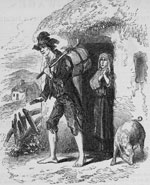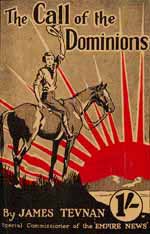Preparing to go

Over the centuries the reason Scots have left their homeland has remained largely the same. Most have sought a better life abroad.
Sometimes the causes and effects of emigration were the subject of fierce public debate in official and unofficial documents.
However, the individual decision to leave home remained a difficult one.
Why go?
In the Highlands the escape from poverty, the landlord, taxation and the prospect of obtaining land elsewhere encouraged emigration. Often the state of agriculture and the economy influenced the decision to leave.
Land and riches
For many Scots the colonies offered new opportunities of progress and in some cases, such as the Australian goldfields, the possibility of obtaining riches quickly. Government schemes offering cheap fares and land ownership promoted emigration to countries such as Canada and Australia.
In many cases there was little choice. Some Scots went abroad for religious reasons, or as prisoners, evacuees or even as victims of kidnap.
Where to go?

Scots have migrated to the nearest neighbouring countries, especially England and Ireland, for many years.
Scottish traders and soldiers were in Poland, Scandinavia and other parts of Europe from the Middle Ages onwards.
In the 17th century Scots tried to establish colonies in Panama and Nova Scotia. The Union of 1707 opened up opportunities for trade. With the growth of the British Empire, Scots had a broader choice of destinations, including the West Indies, North America and Australasia.
Guides and incentives
Newspapers, journals and guides offered a wide range of advice about possible destinations. Official guides were largely concerned with peopling the colonies, and numerous land companies produced their own guides to entice emigrants.
Many guides made unrealistic claims about the destinations they promoted.
There were some economic incentives such as land grants and free passages, but prospective emigrants often relied on personal recommendations from friends and relatives.
- See the Scots Abroad databases for details of material in the National Library of Scotland collections relating to Scots and their experiences overseas.
